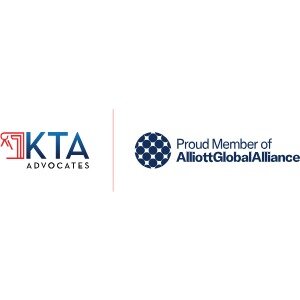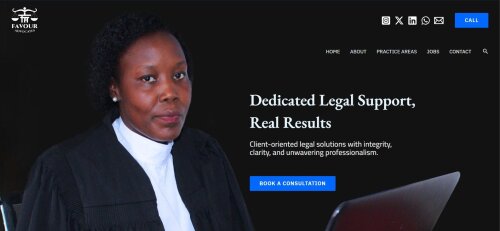Best Pension Lawyers in Uganda
Share your needs with us, get contacted by law firms.
Free. Takes 2 min.
Or refine your search by selecting a city:
List of the best lawyers in Uganda
About Pension Law in Uganda
Pension law in Uganda is designed to provide financial security and support to individuals during their retirement years. The country's pension system is composed of both public and private sector schemes. The main public pension scheme is managed by the National Social Security Fund (NSSF), which covers employees in the formal sector. There are also several private pension schemes that operate under the oversight of the Uganda Retirement Benefits Regulatory Authority (URBRA). These systems are crucial for ensuring that retirees can sustain their livelihoods once they exit the workforce.
Why You May Need a Lawyer
Seeking legal advice in the field of pensions in Uganda is often necessary under several circumstances. For example, individual complicacies related to the claiming of pension benefits, disputes between employers and employees over contributions, or misunderstandings regarding pension entitlements could necessitate legal expertise. Additionally, navigating regulatory compliance for setting up private pension funds, as well as understanding changes in pension laws and how they affect one's retirement benefits, often require the assistance of a knowledgeable lawyer.
Local Laws Overview
Uganda's pension laws are primarily governed by the Uganda Retirement Benefits Regulatory Authority Act, the National Social Security Fund Act, and other relevant legislative frameworks. Key aspects include mandatory contributions by employers and employees to the NSSF, regulations for private pension schemes, and parameters for the disbursement of pension benefits. The laws also stipulate the rights of beneficiaries, management of pension funds, and enforcement mechanisms to ensure compliance and oversight by the URBRA.
Frequently Asked Questions
What is the National Social Security Fund (NSSF)?
The NSSF is a statutory government agency responsible for providing social security services to employees in the formal sector in Uganda. Its primary role is to collect contributions, manage funds, and disburse retirement benefits.
Who is required to contribute to the NSSF?
Employers with five or more employees are required to contribute to the NSSF. Both the employer and the employee make contributions, calculated as a percentage of the employee's earnings.
What happens to my pension if I change jobs?
If you change jobs, your pension contributions can continue with your new employer, provided they are also contributing to the NSSF. You need to ensure your employer is aware of your existing membership to continue your contributions.
How can I know the status of my pension contributions?
The NSSF provides updates on individual accounts through member statements issued annually. You can also access your account details through the NSSF’s online portal or mobile services.
What are the eligibility criteria for accessing pension benefits?
Eligibility for pension benefits depends on factors such as age, total contributions, and the occurrence of specific contingencies like retirement or disability. Usually, members can access benefits upon reaching the official retirement age or earlier if certain conditions are met.
Can expatriates participate in Uganda's pension schemes?
Expatriates who are employed in Uganda may participate in local pension schemes, either through the mandatory NSSF contributions or by enrolling in private pension plans, depending on their employment contracts and status.
Are there any tax benefits associated with pension contributions?
Pension contributions may offer certain tax advantages. Contributions to registered pension schemes may be tax-deductible, but it's essential to consult a tax advisor for specific details aligning with current tax policies.
What should I do if my employer is not contributing to my pension?
If your employer is not complying with their obligation to contribute to the pension fund, it is advisable to report this to the URBRA or seek legal counsel to address the issue and ensure your rights are protected.
How are disputes regarding pensions resolved?
Pension-related disputes can be resolved through administrative proceedings with the URBRA. If necessary, these disputes may escalate to formal legal proceedings in the appropriate courts.
Can I access my pension contributions before retirement?
Under certain conditions, such as permanent migration or specific life contingencies, early access to pension contributions might be allowed. However, details and eligibility criteria should be reviewed carefully to understand any implications.
Additional Resources
For those seeking further information or assistance, consider the following resources:
- Uganda Retirement Benefits Regulatory Authority (URBRA)
- National Social Security Fund (NSSF)
- Local legal aid organizations specializing in retirement benefits
- The Ministry of Finance, Planning, and Economic Development
- Non-governmental organizations focusing on labor and employment rights
Next Steps
If you need legal assistance with pension matters in Uganda, it's advisable to first gather all relevant documents like employment records, pension statements, or correspondence related to your pension. Next, consult with a lawyer who specializes in pension law to assess your situation and advise on the best course of action. You can contact the Uganda Law Society for referrals, or seek out law firms with expertise in labor and pension law for tailored advice. Additionally, make use of available resources from URBRA and NSSF for guidance and support in managing your pension-related issues.
Lawzana helps you find the best lawyers and law firms in Uganda through a curated and pre-screened list of qualified legal professionals. Our platform offers rankings and detailed profiles of attorneys and law firms, allowing you to compare based on practice areas, including Pension, experience, and client feedback.
Each profile includes a description of the firm's areas of practice, client reviews, team members and partners, year of establishment, spoken languages, office locations, contact information, social media presence, and any published articles or resources. Most firms on our platform speak English and are experienced in both local and international legal matters.
Get a quote from top-rated law firms in Uganda — quickly, securely, and without unnecessary hassle.
Disclaimer:
The information provided on this page is for general informational purposes only and does not constitute legal advice. While we strive to ensure the accuracy and relevance of the content, legal information may change over time, and interpretations of the law can vary. You should always consult with a qualified legal professional for advice specific to your situation.
We disclaim all liability for actions taken or not taken based on the content of this page. If you believe any information is incorrect or outdated, please contact us, and we will review and update it where appropriate.
Browse pension law firms by city in Uganda
Refine your search by selecting a city.

















